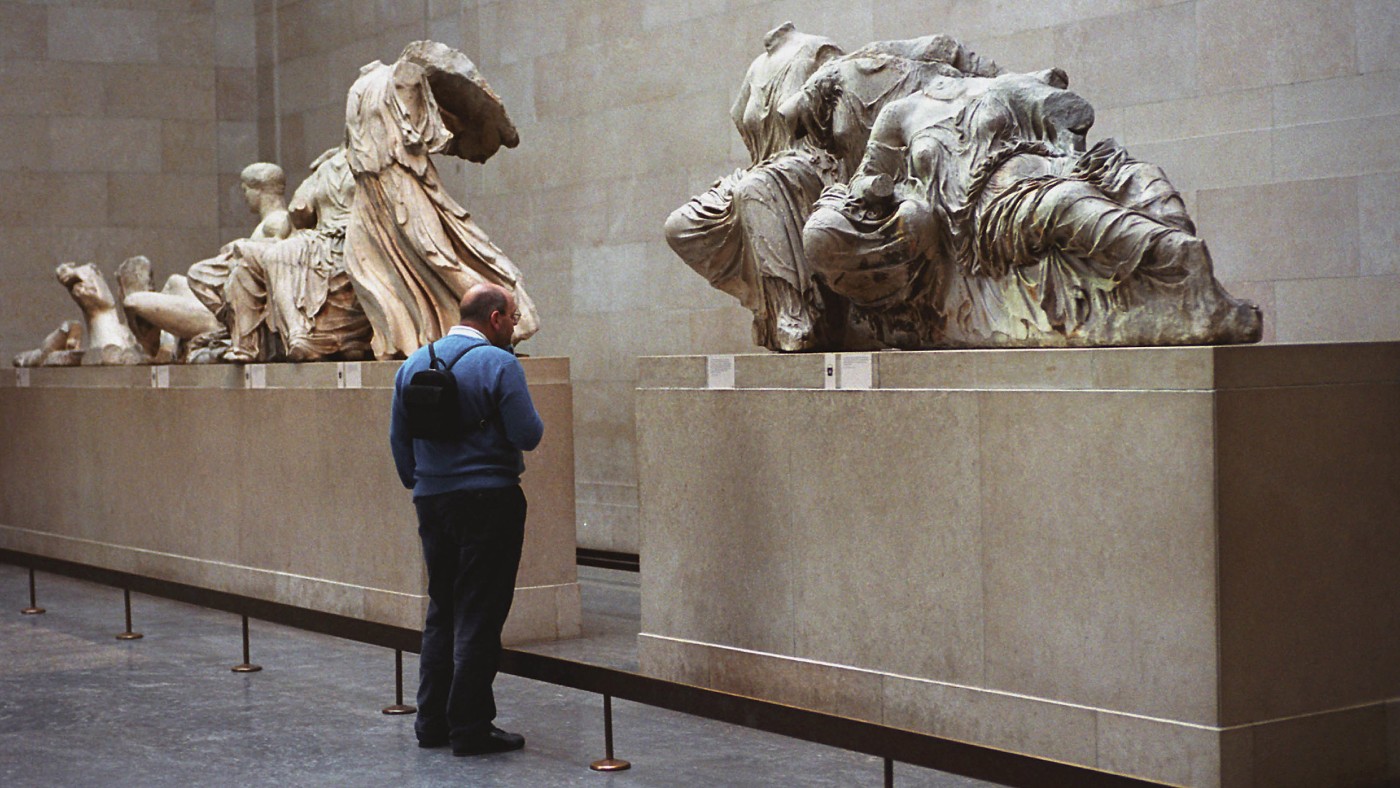Pros and cons of returning the Elgin Marbles to Greece
Rishi Sunak snubs Greek PM as new row over the controversial artefacts erupts

A free daily email with the biggest news stories of the day – and the best features from TheWeek.com
You are now subscribed
Your newsletter sign-up was successful
The controversy over the Elgin Marbles has been reignited after Downing Street cancelled a meeting between Rishi Sunak and the Greek prime minister at the last minute.
The British and Greek governments are "embroiled in a deepening row", said the BBC, after Kyriakos Mitsotakis, the Greek PM, told the BBC on Sunday that the artefects should be returned because having some in London and the rest in Athens was like "cutting the Mona Lisa in half". No.10 subsequently scrapped talks between Sunak and Mitsotakis that were due to take place in London today.
The sculptures’ presence in the UK rather than their original homeland of Greece has been controversial for decades. The marbles, which date back more than 2,500 years, were removed from the Parthenon temple in Athens in the early 19th century by British diplomat Lord Elgin, who was serving as ambassador to the Ottoman Empire, which then controlled Greece.
The Week
Escape your echo chamber. Get the facts behind the news, plus analysis from multiple perspectives.

Sign up for The Week's Free Newsletters
From our morning news briefing to a weekly Good News Newsletter, get the best of The Week delivered directly to your inbox.
From our morning news briefing to a weekly Good News Newsletter, get the best of The Week delivered directly to your inbox.
Pro: legality
This argument is based on the view that Lord Elgin committed an illegal act when he removed the sculptures from the Parthenon and exported them to Britain between 1802 and 1812. The Ottomans, who controlled Greece at the time, didn't have the right to allow Elgin to visit the Parthenon in the first place, it is said.
Greece’s culture minister, Lina Mendoni, said in May that Lord Elgin used "illicit and inequitable means to seize and export" the Parthenon sculptures, without "real legal permission to do so, in a blatant act of serial theft".
Con: could open floodgates
Some believe that Greece's claim on the Elgin Marbles is the tip of an iceberg. If the British Museum were to return the marbles, the "floodgates might open on other restitution claims", said The Guardian as far back as 2003. Nigeria "wants the return of the Benin bronzes, looted by Britain in 1897", it added.
This argument has endured, as have warnings that museums would be diminished if these claims were answered. "If all restoration demands were met, many of the world’s greatest museums would be emptied of their trademark exhibits," said Elginism.
A free daily email with the biggest news stories of the day – and the best features from TheWeek.com
Pro: Britain 'can't be trusted'
Calls for the return of treasures increased after it was revealed in August that thousands of items had been stolen from the British Museum, reported Sky News.
The Elgin Marbles have landed "at the centre of renewed calls for repatriation" amid claims the British Museum's security "cannot be trusted", noted the broadcaster.
Despina Koutsoumba, head of the Greek Association of Archaeologists, said there was shock among colleagues at how items could be stolen from such a renowned institution and then sold on eBay.
Con: safety and preservation
Some argue that, had the marbles remained in Athens, they "likely would have shared the same fate as other ancient sculptures that were destroyed and mutilated", noted Future Learn.
It traces the history of the Parthenon itself, which had sculptures "defaced and displaced" in the sixth century, before being blown up in 1687. Then, during the Grand Tour of the 19th century, European visitors "chiselled away bits and pieces of reliefs and sculptures to take home as souvenirs", while today, the ruins remain vulnerable to Athens' "destructive smog".
Pro: cultural heritage
It is argued that, as the most obvious and symbolic link that modern Athens and modern Athenians have with their ancient ancestors, the pieces represent a crucial and pivotal part of Greek cultural heritage.
"How would Britain feel," asked Future Learn, "if Stonehenge was being held by a foreign power who wouldn't return it?" How is it fair for Britain to keep its most important cultural treasures as well as the most important cultural treasures of other countries?
Con: lost audience
By remaining in the British Museum in London, the marbles serve a "far larger audience" than they would if they were sent back to Athens, said Future Learn.
Writing for The Guardian in 2002, Alan Howarth MP agreed, arguing that "the major museums have always promoted the cultures of other nations by showing and sharing them in an international and historical context".
-
 Local elections 2026: where are they and who is expected to win?
Local elections 2026: where are they and who is expected to win?The Explainer Labour is braced for heavy losses and U-turn on postponing some council elections hasn’t helped the party’s prospects
-
 6 of the world’s most accessible destinations
6 of the world’s most accessible destinationsThe Week Recommends Experience all of Berlin, Singapore and Sydney
-
 How the FCC’s ‘equal time’ rule works
How the FCC’s ‘equal time’ rule worksIn the Spotlight The law is at the heart of the Colbert-CBS conflict
-
 The laws of finding – and keeping – treasure in Britain
The laws of finding – and keeping – treasure in BritainIn the Spotlight Amateur archaeology is on the rise but flouting the laws can land you in prison
-
 Greece legalizes same-sex marriage
Greece legalizes same-sex marriageSpeed Read Greece becomes the first Orthodox Christian country to enshrine marriage equality in law
-
 Pros and cons of the Rwanda deportation policy
Pros and cons of the Rwanda deportation policyPros and Cons Supporters claim it acts as a deterrent but others say it is illegal and not value for money
-
 Battle of Britain: will Rishi Sunak block Scotland’s gender recognition law?
Battle of Britain: will Rishi Sunak block Scotland’s gender recognition law?Today's Big Question Prime minister reportedly set to use constitutional ‘nuclear option’ in showdown with Holyrood over the legislation